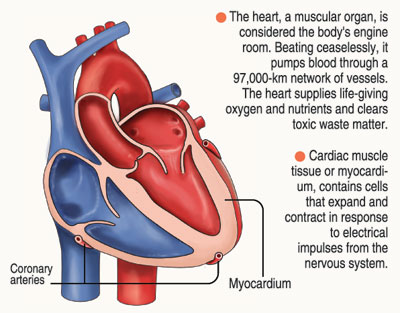News
COVID-19 can affect your heart; take care of it
It was not just a heart attack but one brought on by insidious COVID-19 and donning the heavy, cumbersome and uncomfortable Personal Protective Equipment (PPE), the team which did the stenting was led by Senior Consultant Cardiologist Dr. Gotabhaya Ranasinghe.
“We saved him and he’s back home already,” says Dr. Ranasinghe before turning a strong spotlight on the “double jeopardy” to the essential organ, the heart, by COVID-19.

Dr. Gotabhaya Ranasinghe
Pointing out that when a person gets infected by the SARS-CoV-2 virus, certain “changes” occur within the body, he says that usually it comes through the respiratory system and affects the lungs, the bronchial tubes and blood vessels such as alveoli, bronchioles and capillaries. This is the commonest manifestation of COVID-19 and thereafter some patients descend into deadly COVID-pneumonia.
“The virus also gets into the bloodstream and has a free run to all other organs such as the kidney and brain, with the heart also being very vulnerable to its onslaught,” he says, reiterating that the virus not only affects the heart but also the blood vessels causing severe damage.
Dr. Ranasinghe creates clear images of how COVID-19 can affect the heart. They are:
n Myocarditis brought on by the virus – The structural proteins of the virus include the membrane glycoprotein (M), the envelope protein (E), the nucleocapsid protein (N) and the spike protein (S).
The M and S proteins can easily attach/bind themselves to the heart’s myocardial (muscle) cells as they have on their membrane or wall a receptor-protein or ‘gate’ called ACE2 (angiotensin-converting enzyme 2).
Thereafter, the virus wreaks havoc in the myocardial cells, damaging them and causing myocarditis.
Myocarditis leads to the inflammation of the myocardium (the muscular tissue of the heart) hindering the pumping mechanism.
Often, myocarditis is asymptomatic (without symptoms) or only mildly symptomatic because there are no clinical symptoms. According to data and theories all over the world, roughly about 50-60% who are infected by the virus could get myocarditis.
The only way to determine myocarditis with COVID-19 infection is blood tests such as CPK-MB (creatinine phosphokinase-MB) or troponin. Sometimes, an ECG (electrocardiogram) or imaging might show some changes but not always.
Certain patients with myocarditis go into heart failure. Maybe about 20-30% of those patients who get the infection in the heart would go into heart failure. Heart failure, where the heart gets enlarged and is unable to perform its activities, is a very dangerous condition as it can be fatal.
- Heart attacks and heart failure caused by the coronary arteries being affected – The virus can also bind itself to the cells in the blood vessels, especially the coronary arteries which supply blood to the heart muscle.
How this happensis that the virus attaches itself to the endothelium (the thin membrane that lines not only the heart but also blood vessels).
The lumen which is lined by the endothelium, plays an important role by releasing substances that control vascular relaxation/contraction as well as enzymes that control blood clotting, immune function and platelet adhesion.
The virus damages the lumen and causes inflammation and the smooth-flowing blood becomes turbulent.
Such turbulence affects the platelets which then react with certain chemicals, leading to coagulation (clotting).
Such clots can travel to the heart or block the blood flow to the heart, causing a heart attack.
Another danger is the release of a cytokine storm (a severe immune reaction) in which cytokines also damage the endothelial cells of the coronary artery and the myocardium cells of the heart.

Looking back at the 1½ years that Sri Lanka has been battered by COVID-19, Dr. Ranasinghe says the first wave was brought on by the Alpha variant, the second wave by both the Alpha and Beta variants and now the third wave by the Delta variant.
“In the first two waves, we saw some damage to the heart but it was not that widespread among COVID-19 patients. However, with Delta, the situation has changed drastically. We are seeing more and more heart involvement,” he says.
In a couple of weeks, there have been 20-25 patients at the NHSL who had suffered heart attacks due to COVID-19 infections.
“They come because of the heart attack but when we check the blood, they are positive. They have also not been those who are likely to suffer heart attacks because they are young and do not have any conventional risk factors such as cholesterol, diabetes, hypertension, etc. So, we can assume that it is COVID which is having an impact on their hearts,” he said, adding that they have also seen a few patients, around 5-6, with COVID and a weak heart, most likely due to myocarditis.
When asked about deaths, he said that the majority of patients have been saved but there have been a couple of deaths. Some patients have come to hospital too late and others have had conventional risk factors which made them very vulnerable and high risk.
| Follow preventive measures and advice to those in home-based care “Your heart is very vulnerable, so try and prevent catching COVID-19,” stresses Dr. Gotabhaya Ranasinghe, pointing out that even when the lungs are hit, causing low oxygen levels (hypoxia) or pneumonia, it has an impact on the heart. He requests people to follow the simple preventive measures of wearing a face mask, hand hygiene, social distancing, quarantining and isolation if ill so as to not give it to others. Dr. Ranasinghe’s advice to those in home-based care is:
| |

